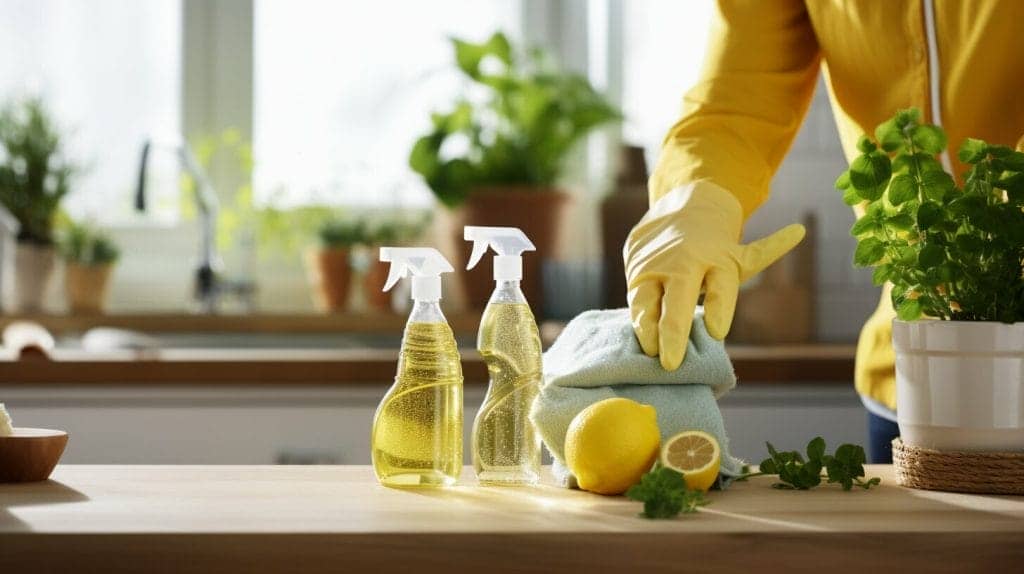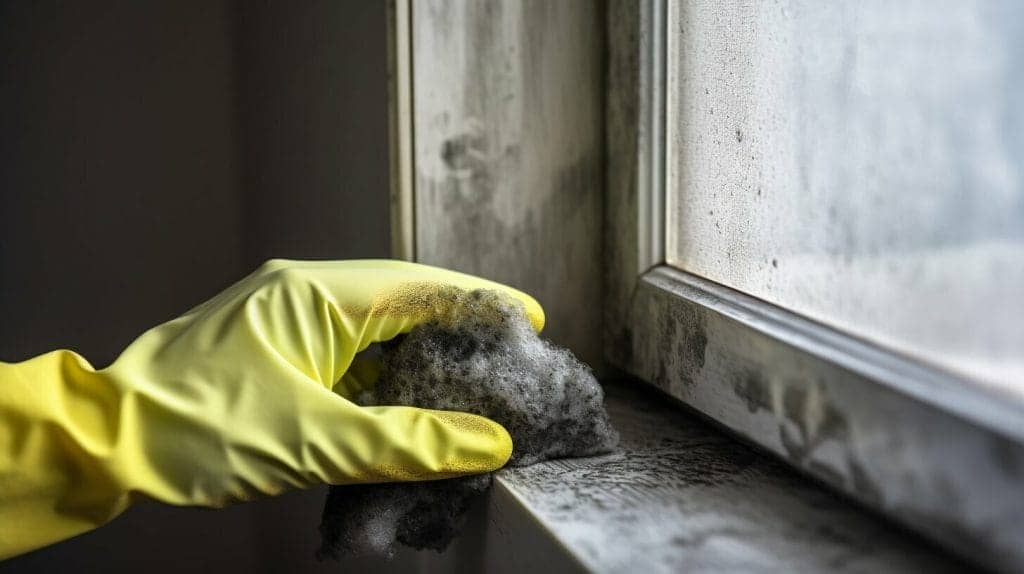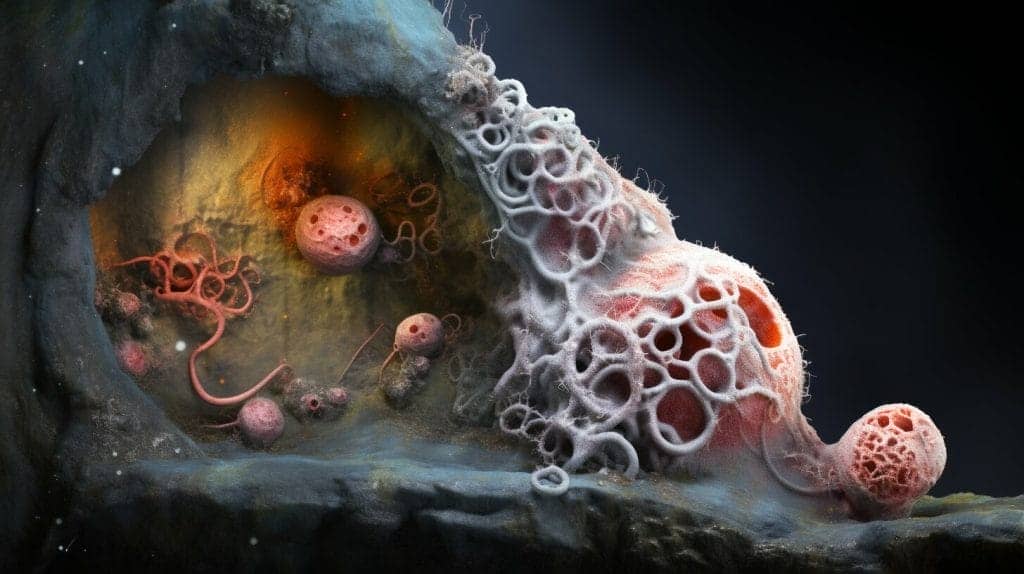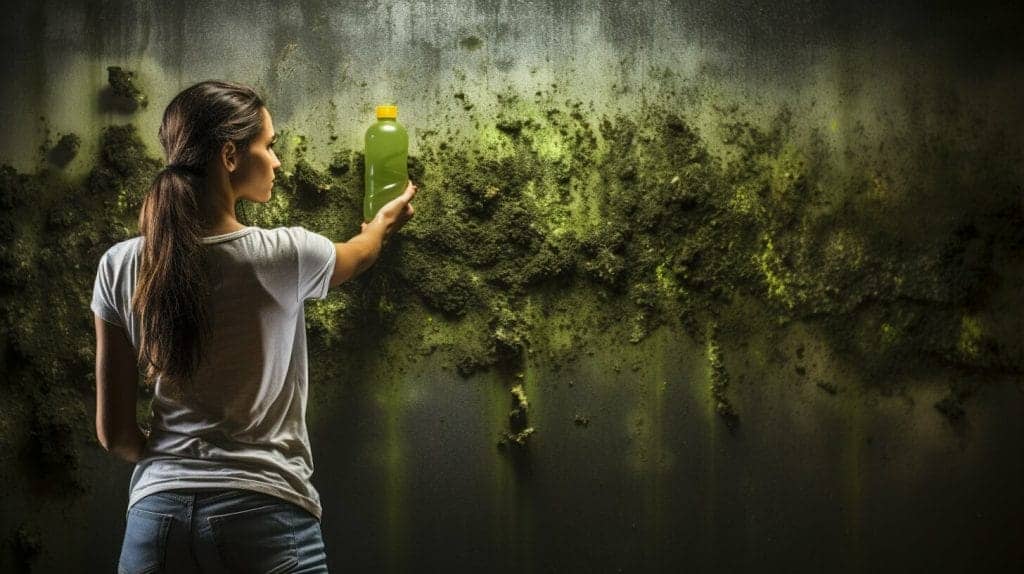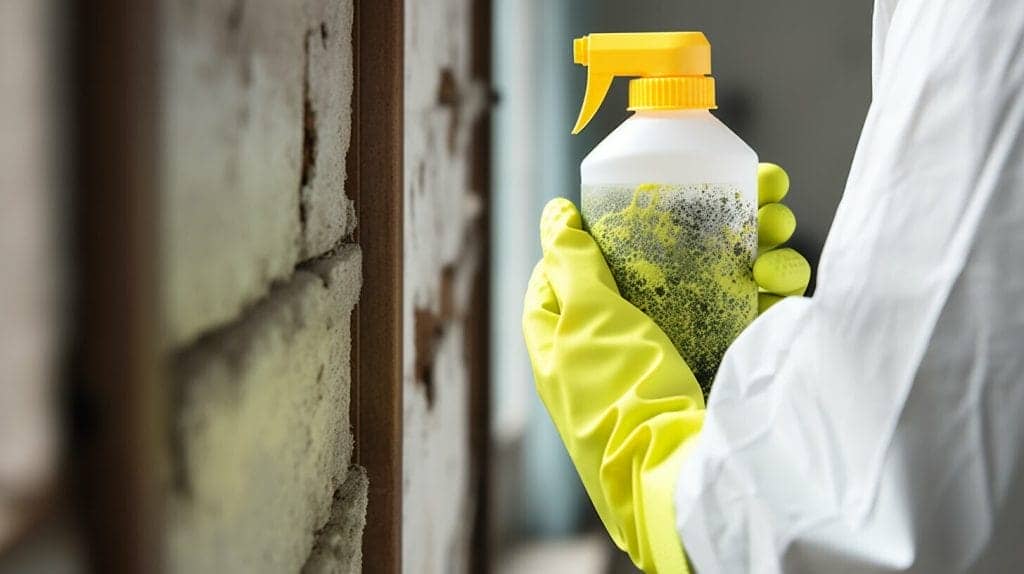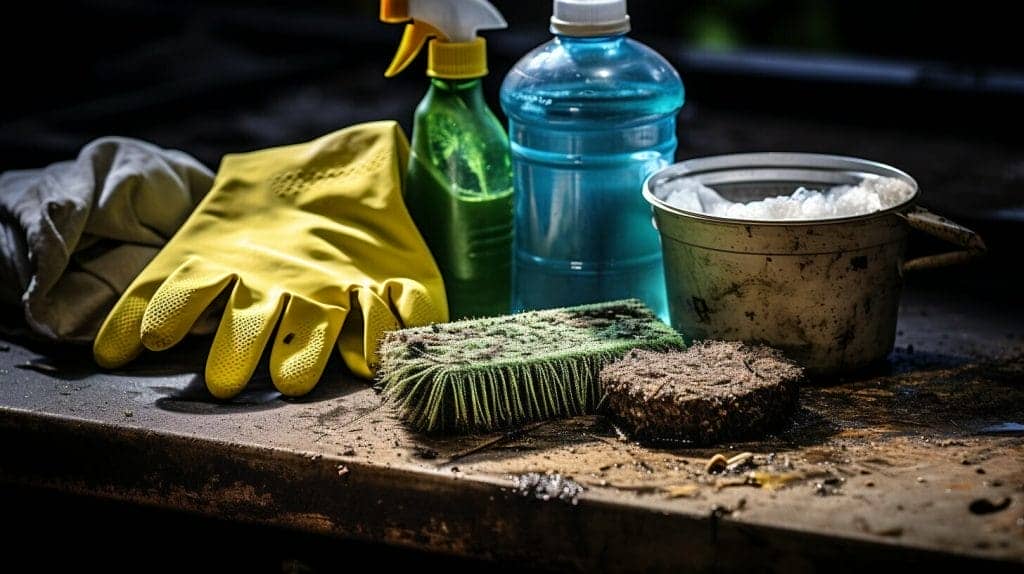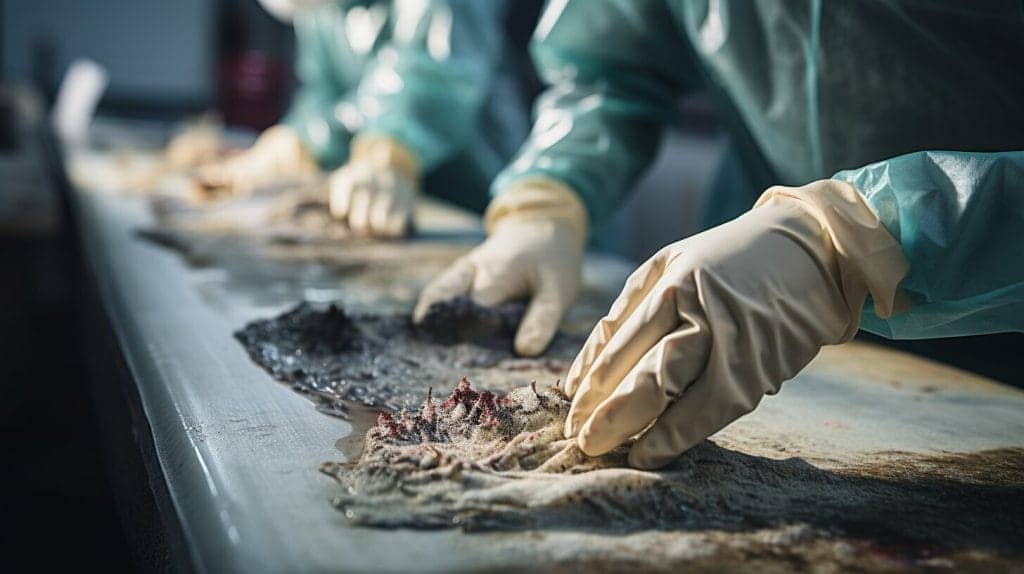Home remedies for mold exposure are becoming increasingly popular among individuals concerned about the health risks associated with mold growth in their homes. Mold exposure can cause various symptoms such as respiratory issues, allergies, and headaches, making it essential to take proactive measures to protect one’s family and home from this harmful fungus.
Fortunately, there are various natural remedies available that can be easily implemented by individuals to alleviate symptoms and maintain a healthier living environment. This article covers a range of effective home remedies for mold that can help individuals deal with mold exposure issues in their homes.
Key Takeaways:
- Mold exposure can cause various symptoms such as respiratory issues, allergies, and headaches
- There are various natural remedies available that individuals can easily implement to alleviate symptoms and maintain a healthier living environment
- This article covers a range of effective home remedies for mold that can help individuals deal with mold exposure issues in their homes
Understanding Mold Exposure: Symptoms and Prevention
Mold exposure is a serious concern for many individuals, especially those with weakened immune systems or pre-existing respiratory conditions. Exposure to mold can cause a range of symptoms, from mild irritation to severe health problems. In this section, we’ll explore the symptoms of mold exposure and provide tips on how to prevent mold growth in the home.
Symptoms of Mold Exposure
The symptoms of mold exposure can vary depending on the individual and the extent of the exposure. Common symptoms include:
- Respiratory issues such as coughing and wheezing
- Allergy-like symptoms such as sneezing, runny nose, and itchy eyes
- Headaches and fatigue
- Skin irritation
Individuals with pre-existing conditions such as asthma or allergies may experience more severe symptoms when exposed to mold.
Preventing Mold Exposure
Preventing mold exposure is crucial to maintaining a healthy living environment. Here are some tips to prevent mold growth:
- Keep humidity levels low, ideally between 30% and 50%.
- Fix leaks and water damage promptly.
- Improve ventilation in moisture-prone areas such as bathrooms, kitchens, and basements.
- Regularly clean and dust all surfaces.
- Use air purifiers and dehumidifiers to improve indoor air quality.
- Refrain from carpeting bathrooms and other moisture-prone areas.
By taking proactive measures to prevent mold growth in the home, individuals can minimize the risks of mold exposure and maintain a healthy living environment.
Holistic Treatments for Mold Exposure at Oasis Medical Institute
Oasis Medical Institute in Tijuana, MX, offers a unique and integrative approach to treating mold exposure. The institute is under the leadership of Dr. Francisco Contreras MD, who has over 35 years of clinical experience and is recognized as a leading authority in alternative cancer treatments and chronic diseases.
Oasis Medical Institute’s holistic Mold Toxicity treatment program involves an individualized approach that combines conventional medicine with holistic therapies to address mold-related health issues. The program includes a comprehensive assessment to determine the patient’s specific health needs, followed by a tailored treatment plan that includes detoxification, nutrient supplementation, and immune support.
The integrative approach at Oasis Medical Institute is designed to address the underlying causes of mold exposure, including immune system dysfunction, gut issues, and chronic inflammation. The program’s aim is not only to alleviate symptoms but also to help patients regain their overall health and well-being.
Natural Home Remedies for Mold Exposure
When dealing with mold exposure, individuals can turn to natural remedies to help alleviate symptoms and prevent further growth. Here are some effective home remedies:
| Remedy | Instructions |
|---|---|
| Vinegar | Mix equal parts of white vinegar and water. Spray affected areas and let it sit for an hour. Wipe clean. |
| Tea Tree Oil | Mix 10 drops of tea tree oil with 1 cup of water. Spray or wipe the mixture on affected areas. |
| Hydrogen Peroxide | Mix 1 part 3% hydrogen peroxide and 2 parts water. Spray or wipe the mixture on affected areas. Let it sit for 10 minutes before wiping clean. |
| Baking Soda | Mix baking soda with water to form a paste. Apply the paste to affected areas and scrub with a brush. Rinse with water. |
These natural remedies can provide an effective and safe alternative to chemical-based products. It is important to note that while these remedies can help reduce symptoms and prevent further mold growth, they may not completely remove the mold. If mold growth is extensive, professional help may be necessary.
DIY Remedies for Mold Exposure
For those who prefer to tackle mold exposure on their own, there are several do-it-yourself remedies available. Check out these easy and effective options:
- Vinegar: This natural acid works wonders in killing mold and preventing it from growing further. Mix equal parts of distilled white vinegar and water and spray it onto the affected areas. Let it sit for a few hours before wiping it off with a clean cloth.
- Tea Tree Oil: This essential oil has antimicrobial properties that can effectively kill mold. Mix a teaspoon of tea tree oil with a cup of water and spray it onto the affected areas. Leave it on without wiping it off.
- Hydrogen Peroxide: This oxidizing agent can effectively kill mold and remove stains. Mix equal parts of hydrogen peroxide and water and spray it onto the affected areas. Let it sit for 10-15 minutes before wiping it off with a clean cloth.
- Baking Soda: This household staple can effectively eliminate mold and absorb excess moisture. Mix a quarter tablespoon of baking soda with water and spray it onto the affected areas. Let it sit for a few minutes before wiping it off with a clean cloth.
Remember to wear protective gear, such as gloves and goggles, when using any of these remedies. Follow safety precautions and thoroughly clean affected areas to prevent further mold growth.
Maintaining a Mold-Free Environment
Preventing mold growth is the most effective way to maintain a mold-free environment. Here are some tips:
- Keep humidity levels low, ideally between 30-50%, by using dehumidifiers and air conditioners.
- Fix leaks and water damage promptly, within 24-48 hours, to prevent moisture buildup and mold growth.
- Improve ventilation in moisture-prone areas such as bathrooms, kitchens, and basements.
- Clean and dry wet or damp areas and items thoroughly, including carpets and upholstery.
- Eliminate clutter and keep the living space clean to minimize dust and mold accumulation.
- Regularly inspect the home for signs of mold growth, including musty odors, discoloration, and water damage.
By following these tips, individuals can create a mold-free environment and protect themselves and their families from the harmful effects of mold exposure.
Importance of Indoor Air Quality
Good indoor air quality is essential for maintaining a healthy living environment, especially when it comes to preventing mold exposure. Proper ventilation and air filtration can help remove mold spores and other harmful particles from the air, reducing the risk of respiratory issues and other health problems.
One effective strategy for improving indoor air quality is to use air purifiers. These devices are designed to filter out airborne pollutants, including mold spores and other allergens. Look for air purifiers with HEPA filters, which can capture even the smallest particles.
Another way to improve indoor air quality is to ensure proper ventilation. This can be achieved by opening windows and doors, using exhaust fans in bathrooms and kitchens, and maintaining your HVAC system. A professional HVAC technician can inspect and clean your system to ensure it is functioning properly and not contributing to mold growth.
Regular air quality testing can also help identify any indoor air quality issues and inform appropriate remediation efforts. Testing can be done by professionals or through DIY air quality testing kits.
Healthy Lifestyle Practices to Combat Mold Exposure
Living a healthy lifestyle can go a long way in combating the effects of mold exposure and enhancing the body’s natural defenses against related health issues. Incorporating the following practices in daily routines can help individuals maintain optimal health:
Eating a Balanced Diet
Consuming a balanced and nutritious diet can strengthen the immune system and promote overall well-being. Include plenty of fruits and vegetables, lean proteins, and healthy fats in daily meals.
Regular Exercise
Regular physical activity can improve lung function and boost the body’s natural defenses against respiratory illnesses. Engage in at least 30 minutes of moderate-intensity exercise daily.
Stress Management
Chronic stress can weaken the immune system and contribute to various health issues. Incorporate stress-reducing activities such as meditation, yoga, or deep breathing exercises into daily routines.
Adequate Sleep
Getting enough restorative sleep is essential for maintaining optimal health and supporting the body’s natural healing processes. Aim for 7-9 hours of sleep each night.
Proper Hydration
Adequate hydration is vital for flushing toxins out of the body and maintaining optimal health. Drink at least 8-10 glasses of water each day.
Seeking Professional Help for Severe Mold Exposure
While home remedies can be effective for mild cases of mold exposure, severe cases may require professional intervention. Prolonged exposure to mold can lead to serious health risks, including respiratory issues, neurological problems, and even death in rare cases. Therefore, seeking medical evaluation and treatment is crucial for individuals experiencing severe symptoms.
Specialized clinics or medical professionals can provide targeted remedies for mold-related illnesses and offer personalized treatment plans based on the individual’s condition and medical history. It is important to remember that untreated mold exposure can lead to long-term health effects, so seeking professional help is essential for those who suspect they have been exposed to high levels of mold.
Creating a Mold-Safe Home Environment
To maintain a mold-free home, it’s important to take proactive measures to prevent mold growth. Regular inspections and prompt repair of water damage are key to controlling moisture levels and minimizing mold accumulation. Additionally, proper ventilation in moisture-prone areas like bathrooms, kitchens, and basements can reduce humidity and prevent mold growth.
It’s recommended to maintain a clean and clutter-free living space, as mold can accumulate in dusty or neglected areas. Regular cleaning practices, such as wiping down surfaces and vacuuming carpets, can also help prevent mold growth.
| Tip | Description |
|---|---|
| Monitor humidity levels | Use a hygrometer to measure humidity levels and keep them below 60%. |
| Improve ventilation | Use exhaust fans and open windows to improve air circulation. |
| Eliminate moisture-prone areas | Repair leaks promptly and avoid leaving wet or damp items in the home. |
If you suspect mold growth in your home, it’s important to address it promptly and thoroughly. Consider hiring a certified mold professional for extensive mold issues or recurring problems. Complete mold removal and remediation processes are crucial for maintaining a mold-safe environment and protecting your overall well-being.
The Role of Professional Mold Remediation
While home remedies can be effective for minor mold issues, professional intervention is necessary for extensive or recurring mold problems. Certified mold professionals have the expertise and equipment to identify and address mold-related issues effectively. They follow industry-standard protocols for thorough mold removal and remediation processes to ensure the safety and cleanliness of the affected area.
Professional mold remediation services can be especially beneficial for those with severe mold exposure or health issues related to mold exposure. The mold remediation process usually involves identifying the root cause of the problem, containing the affected area, removing contaminated materials, and disinfecting and drying out the area to prevent further mold growth.
If you are dealing with severe mold exposure, it is important to seek professional help immediately. Do not attempt to handle the issue on your own, as you may risk further exposure and health risks. Contact a certified mold professional to evaluate the situation and provide effective remediation solutions.
Maintaining a Mold-Free Lifestyle
Maintaining a mold-free lifestyle extends beyond simply taking preventative measures in one’s home. It is equally important to be aware of mold exposure in workplaces, schools, and other frequented areas.
Individuals can take proactive steps to maintain a mold-free environment by advocating for proper ventilation and maintenance in shared areas. Regular cleaning practices, mold awareness, and prompt reporting of any signs of mold growth can also help prevent the spread of mold-related health issues.
By creating a mold-safe lifestyle, individuals can protect their overall well-being and reduce the risk of mold exposure in both personal and shared environments.
Conclusion
In conclusion, home remedies for mold exposure can be effective in providing solutions for individuals to maintain a healthier living environment. Natural remedies and DIY solutions can help alleviate symptoms and prevent mold growth in the home. However, for severe cases, it is important to seek professional help from certified mold professionals or specialized clinics to avoid potential health risks.
Proactive measures such as maintaining good indoor air quality, regular cleaning practices, and proper ventilation can significantly reduce the risk of mold exposure. Lifestyle practices such as a healthy diet, regular exercise, and stress management can also support the body’s natural defenses against mold-related health issues.
Creating a mold-safe home environment requires regular inspections for mold growth, prompt repair of water damage, and proper ventilation in moisture-prone areas. Thorough mold removal and remediation processes by professional experts can eradicate extensive or recurring mold issues.
Finally, it is essential to maintain a mold-free lifestyle beyond the home by ensuring proper maintenance and mold awareness in shared environments. By taking proactive measures and adopting a mold-safe lifestyle, individuals can protect their overall well-being and prevent potential health risks associated with mold exposure.
FAQ
Q: What are some effective home remedies for mold exposure?
A: Some effective home remedies for mold exposure include using vinegar, tea tree oil, hydrogen peroxide, and baking soda to clean and disinfect affected areas. These natural remedies can help alleviate symptoms and provide a safer alternative to chemical-based products.
Q: What are the common symptoms of mold exposure?
A: Common symptoms of mold exposure include respiratory issues, allergies, headaches, and fatigue. It’s important to identify and address mold issues promptly to minimize health risks.
Q: Can mold exposure be prevented?
A: Yes, mold exposure can be prevented. Proper ventilation, moisture control, and regular cleaning are some effective methods to prevent mold growth. It’s essential to maintain a clean and well-ventilated living environment and promptly address any water damage or moisture-related issues.
Q: Is there a holistic treatment for mold exposure at Oasis Medical Institute in Tijuana, MX?
A: Yes, Oasis Medical Institute in Tijuana, MX offers holistic treatment for mold exposure. Dr. Francisco Contreras MD specializes in treating Mold Toxicity and uses an integrative approach that combines medicine and holistic therapies. For more information about the holistic Mold Toxicity treatment program, please book a consultation or call the institute.
Q: What are some DIY remedies for mold exposure?
A: Some DIY remedies for mold exposure include creating homemade mold removal solutions using household ingredients. It’s important to wear protective gear and follow safety precautions when dealing with mold.
Q: How can one maintain a mold-free environment at home?
A: To maintain a mold-free environment at home, it’s essential to keep humidity levels low, fix leaks promptly, and improve ventilation. Regular cleaning practices and eliminating moisture-prone areas can also help prevent mold growth.
Q: How can indoor air quality be improved to prevent mold exposure?
A: Indoor air quality can be improved by using air purifiers, proper ventilation systems, and regular air quality testing. Keeping the home clean, dust-free, and well-ventilated is also important in preventing mold exposure.
Q: What are some healthy lifestyle practices to combat mold exposure?
A: Maintaining a healthy lifestyle can help individuals combat mold exposure naturally. This includes following a healthy diet rich in immune-boosting foods, engaging in regular exercise, managing stress, getting adequate sleep, and staying properly hydrated.
Q: When should professional help be sought for severe mold exposure?
A: Professional help should be sought for severe cases of mold exposure. Prolonged exposure to mold can lead to serious health risks, and medical evaluation and treatment may be necessary. Specialized clinics or medical professionals can provide targeted remedies for mold-related illnesses.
Q: How can one create a mold-safe home environment?
A: To create a mold-safe home environment, it’s important to regularly inspect for mold growth, promptly repair water damage, and ensure proper ventilation in moisture-prone areas. Maintaining a clean and clutter-free living space can also help minimize mold accumulation.
Q: What is the role of professional mold remediation in addressing mold exposure?
A: While home remedies can be effective for minor mold issues, professional mold remediation is necessary for extensive or recurring mold problems. Certified mold professionals have the expertise to thoroughly remove and remediate mold, ensuring a safer living environment.
Q: How can one maintain a mold-free lifestyle beyond their home?
A: To maintain a mold-free lifestyle beyond the home, it’s important to prioritize proper ventilation and maintenance in workplaces, schools, and other frequented areas. Regular cleaning, mold awareness, and prompt reporting of signs of mold growth in shared environments are crucial in preventing mold exposure.
Dr. Francisco Contreras, MD is a renowned integrative medical physician with over 20 years of dedicated experience in the field of integrative medicine. As the Medical Director of the Oasis of Hope Hospital in Tijuana, Mexico, he has pioneered innovative treatments and integrative approaches that have been recognized globally for the treatment of cancer, Lyme Disease, Mold Toxicity, and chronic disease using alternative treatment modalities. Dr. Contreras holds a medical degree from the Autonomous University of Mexico in Toluca, and speciality in surgical oncology from the University of Vienna in Austria.
Under his visionary leadership, the Oasis of Hope Hospital has emerged as a leading institution, renowned for its innovative treatments and patient-centric approach for treating cancer, Lyme Disease, Mold Toxicity, Long-Haul COVID, and chronic disease. The hospital, under Dr. Contreras's guidance, has successfully treated thousands of patients, many of whom traveled from different parts of the world, seeking the unique and compassionate care the institution offers.
Dr. Contreras has contributed to numerous research papers, articles, and medical journals, solidifying his expertise in the realm of integrative medicine. His commitment to patient care and evidence-based treatments has earned him a reputation for trustworthiness and excellence. Dr. Contreras is frequently invited to speak at international conferences and has been featured on CNN, WMAR2 News, KGUN9 News, Tyent USA, and various others for his groundbreaking work. His dedication to the medical community and his patients is unwavering, making him a leading authority in the field.
Contreras has authored and co-authored several books concerning integrative therapy, cancer, Lyme Disease and heart disease prevention and chronic illness, including "The Art Science of Undermining Cancer", "The Art & Science of Undermining Cancer: Strategies to Slow, Control, Reverse", "Look Younger, Live Longer: 10 Steps to Reverse Aging and Live a Vibrant Life", "The Coming Cancer Cure Your Guide to effective alternative, conventional and integrative therapies", "Hope Medicine & Healing", "Health in the 21st Century: Will Doctors Survive?", "Healthy Heart: An alternative guide to a healthy heart", “The Hope of Living Cancer Free”, “Hope Of Living Long And Well: 10 Steps to look younger, feel better, live longer” “Fighting Cancer 20 Different Ways”, "50 Critical Cancer Answers: Your Personal Battle Plan for Beating Cancer", "To Beat . . . Or Not to Beat?", and “Dismantling Cancer.”

